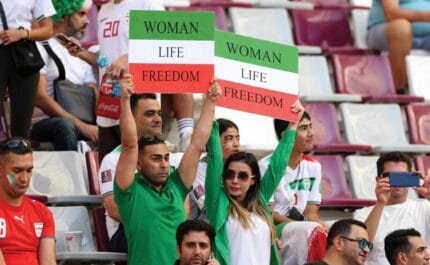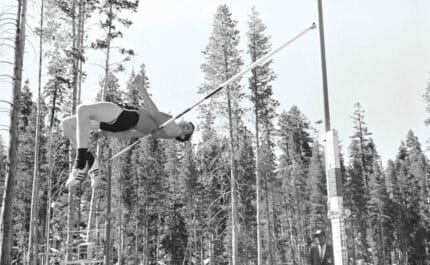The longest night
In the early hours of New Year’s Day, hundreds of women were assaulted while celebrating in Cologne. Five months on, Matthew Lee reports on the seismic political and social fallout
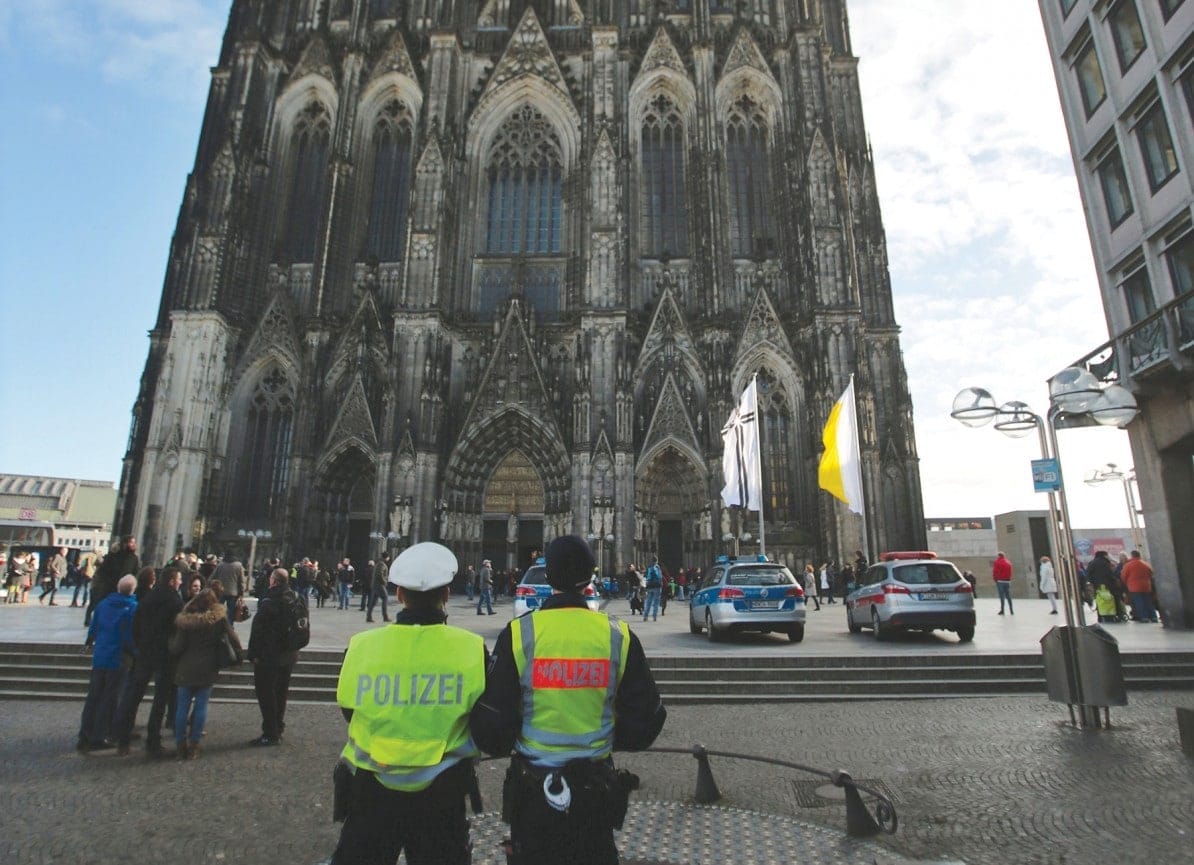
1st January 2016 (Taken from: #22)
On New Year’s Day morning, the Cologne police published a statement on its Facebook page about its work the previous night. The headline was: “Festive Atmosphere – Celebrations Largely Peaceful”.
In truth they were anything but.
On 5th January the authorities backtracked: police chief Wolfgang Albers said that large gangs of intoxicated men had targeted women near the cathedral and main train station. Albers, who would be ushered into “provisional retirement” shortly afterwards, said that many women had been robbed and sexually assaulted. The attackers, he said, appeared predominantly to be men of Arab and North African appearance.
Officials urged the public not to assume that the perpetrators were migrants. But within a week it became clear that most of the men involved were indeed asylum seekers and refugees. The huge task of integrating the up to 1.1 million people who arrived in Germany in 2015 had just become even harder.
The police released a piece of footage from the night of the attacks. The camerawork is shaky and the atmosphere is tense and chaotic. You can hear firecrackers going off, the crunch of broken glass and a woman screaming “don’t touch me” at her attackers. A handful of officers caught on film look confused and disorganised as they scatter through the square.
Four months later the square is almost deserted as I cross from Cologne’s glass-panelled train station to the steps of its medieval cathedral at midnight. The scene is quiet: three men kicking around a plastic football, a couple of drunks shouting at nobody in particular. A group of underemployed police officers survey the scene from a recently installed security booth.
There has been an increased police presence here ever since Wolfgang Albers’ force was lambasted for failing to protect the public on New Year’s Eve, and for minimising the incident in its statement the following morning. There were widespread suggestions of a cover-up – had they intentionally misled the public to avoid stoking anti-immigrant anger?
The authorities braced for an increase in far-right attacks on asylum seekers and refugees, which had already risen by over 40 percent in 2015”
The news media were criticised for taking so long to report on the violence. Public broadcaster ZDF apologised for its silence, and German lawmakers from across the political spectrum argued that the ethnicities of the suspected perpetrators meant that it was time for a difficult national debate about a clash of cultures that might occur when over a million people – predominantly young Muslim men – arrive in a Western country in a single year.
Victims spoke of their experiences on TV news. “All of a sudden these men around us began groping us,” said one unnamed woman. “They touched our behinds and grabbed between our legs. They touched us everywhere… I thought to myself that if we stay here in this crowd they could kill us, they could rape us, and nobody would notice… There was no one around us who helped or was in a position to help… I was scared that I wouldn’t leave this crowd alive.” Meanwhile, the tabloid Bild published what it claimed was a leaked report from Cologne police. It quoted a suspect saying to a police officer: “I am Syrian. You have to treat me kindly. Mrs Merkel invited me.”
On 11th January, Ralf Jäger, interior minister of the state of North Rhine-Westphalia, in which Cologne is the biggest city, claimed that the New Year’s Eve attackers were “almost exclusively” North Africans. He said the men had become “intoxicated with drugs and alcohol” and “acted out fantasies of sexual omnipotence.” Far-right groups would attempt to exploit the incident to stir up violence against migrants, Jäger warned, and people should not respond to such provocations. By 18th January almost 900 people, including 497 women alleging sexual assault, had filed criminal complaints with police relating to New Year’s Eve violence. A first arrest was made on that day. A 26-year-old Algerian asylum seeker, suspected of having groped a woman and stolen her phone, was detained at a refugee shelter in a small town southwest of the city.
While the right-wing press across Europe had a field day – the UK’s Daily Mail referred to the “baying groups of immigrant men in a free-for-all of humiliation and degradation” – liberals tried to get to grips with tough questions on culture, religion and women’s rights. Were backers of Willkommenskultur – a “culture of welcoming” that saw Germany step in to shoulder much of the burden of handling Europe’s refugee crisis – unwilling to acknowledge that violence against women might be a consequence of the influx of Muslim males into the country on an unprecedented scale? Was the integration of so many people into German society a realistic goal?
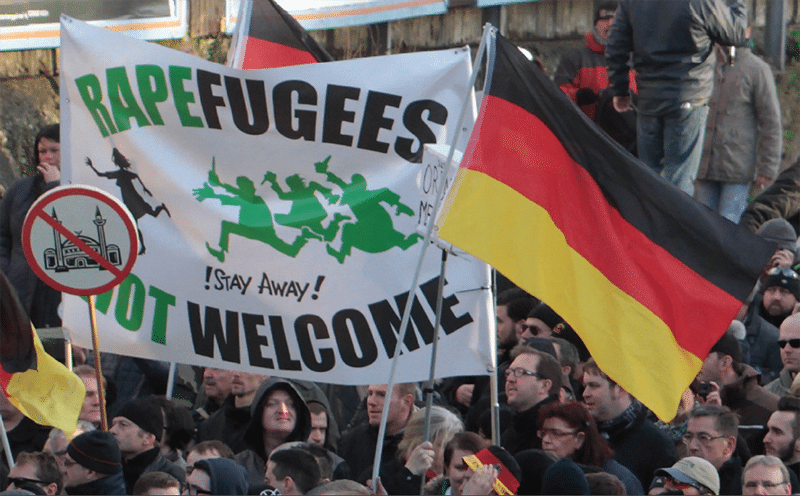
A rally staged by the Dresden-based anti-Islam Pegida movement in Cologne on 9th January saw its far-right followers clash with police officers and anti-racism activists: three days later a much bigger rally was staged in Dresden. Photo: Juergen Schwarz/AP/Press Association Images
Roman Lehberger, a broadcast journalist with Der Spiegel who has reported on the attacks for five months, says the incidents made Germans engage with difficult but important questions. “It became clear that it’s not all rosy with so many refugees and migrants coming to Germany,” he says. “There are problems that needed to be talked about and a lot of people in the media and even the authorities were afraid at first to address them in case they were labelled racist. There were things that hadn’t been addressed before, like the problems with young migrants from North Africa and theft and sexual assault. The discourse changed after Cologne.”
From Angela Merkel’s perspective, this change came at an inopportune moment. Her open-door policy may have garnered praise from Barack Obama and a Person of the Year award from Time magazine, but her approval ratings were in decline – from 75 percent in late 2014 to just 46 percent in February 2016. Meanwhile, Germany’s far-right parties were in the ascendency. They used the November 2015 terror attacks in Paris as an example of how the government’s lenient approach to immigration enabled criminals, troublemakers and extremists to enter Europe posing as asylum seekers – and the Cologne attacks gave them even more ammunition.
On 12th January, an estimated 25,000 people attended a Dresden rally organised by far-right group Pegida, created to fight what it sees as the “Islamification of the West”. Their flags and banners, many marked with inflammatory slogans, were widely published and shared on social media. In May 2016, anti-immigration party Alternative für Deutschland (AfD), which had described the Cologne attacks as “a foretaste of our country’s impending cultural and civilisational collapse”, adopted an explicitly anti-Islam platform for the first time. The authorities braced for an increase in far-right attacks on asylum seekers and refugees, which had already risen by over 40 percent in 2015. In the first three months of 2016 alone, there were 37 separate arson attacks on refugee accommodation across Germany.
Angela Merkel proposed tougher immigration laws in the aftermath of Cologne to make it easier to deport asylum seekers who commit crimes. But her continued defence of the open-door policy was being challenged by an increasingly sceptical German public. A mid-January survey by polling agency INSA reported 61 percent of respondents saying the Cologne attacks had made them less happy about accepting refugees into the country. Some of the chancellor’s CDU party allies also expressed doubts. “Cologne has changed everything,” said party vice-president Volker Bouffier. Another CDU politician, Carsten Linnemann, was reported to have said that “Cologne shows that if the influx [of asylum-seekers] is so high, integration will not work.”
Wilhelm Steitz is the refugee crisis manager for North Rhine-Westphalia, which has taken in more asylum seekers than any other German state.
“We were completely overwhelmed,” Steitz recalls. “In 2007 we had 7,000 people a year seeking political asylum in North Rhine-Westphalia. Last year we had 20,000 people a week. It was unbelievable. We had to construct a completely new infrastructure to deal with the problem. It takes a long time to increase your capacity by 20 or 30 times.”
But the creation of a massively enhanced infrastructure was, relatively speaking, the easy part. “Hundreds of school sports halls in Germany were used because you’ve got space, showers and toilets,” he says. “You put up beds, order a caterer, and everything’s fine. But what comes after – integration – is the truly difficult part. How do you teach all these people German, get the adults into jobs, the children into schools? How do you determine which people should be granted political asylum? Anyone off the street can put camping beds in a sports hall, but it’s hard to find skilled people – teachers of German as a second language, interpreters, specialists to assess asylum applications. You can build a school in three months out of containers. But it takes three or four years to train new teachers.” The closure of the so-called “West Balkan” route from Greece into central Europe in March has meant that the influx of arrivals into North Rhine-Westphalia has slowed to manageable levels, around 1,000 a week. But Steitz still faces a backlog of approximately 120,000 people who have not yet been able to begin the process of applying for political asylum.
When it comes to the Cologne attacks, Steitz accepts that there’s a problem with a certain group of migrants from North African countries. “There are people here who have, in a dual way, no prospects. For a young man of 18 to 20 in Algeria or Morocco there is extremely high unemployment and no prospect of a job. And when they reach Western Europe they don’t have the employment skills or the language skills for the job market – so they have almost no chance. They are unable to obtain the right to stay in Germany and their own countries don’t want them, and they end up lost between their old and new homes.”
“They get stupid ideas and get involved in stupid behaviour when they drink alcohol,” Steitz says. “I don’t want to excuse this behaviour, I just want to try and explain part of it. These men are part of a lost generation. They had no prospects at home, and they didn’t find any prospects here. They’re desperate.”
Steitz insists that while public opinion was affected by Cologne, the people of his state remain welcoming to refugees on the whole. “I still go to many events where I feel the unbelievable hospitality of German people,” he says. “People are willing to share what we have here. But this hospitality is carried by the fact that our wellbeing continues to be undisturbed. If things get much worse economically I don’t know if so many people will be willing to share.”
“The people of Cologne are very welcoming and friendly,” says Sakher al-Mohamad, 27, whom I meet in a grungy cafe in the city’s university district. “I’m happy to live in such an international city.”
The Homs native, who worked as a journalist before fleeing the Syrian civil war, has been in Germany since late 2014. He sips cola, repeatedly checks his phone, and explains how the Cologne attacks left him – and many other Syrian refugees in the region – shocked, angry and deeply concerned. “I felt it was important to say that not all refugees are the same,” he explains. “The media were speaking about refugees in very general terms and I wanted to say that our Syrian culture rejects attacks on women one hundred percent. The criminals don’t represent Syrian, Arab or Muslim culture. They only represent themselves.”
“Politicians say they are with or against refugees because they want to be more famous. But we’re just normal people. Some good people, some bad people”
Al-Mohamad started a Facebook group, Syrians Against Sexism, and on 16th January some of its members stood outside Cologne train station and handed out flowers. Their placards carried slogans: “We Respect German Values” and “We Are Against Sexism”.
He dismisses the notion that men who have lived through a civil war are prone to acting violently, and may take their anger and frustration out on European women. “Victims of war came to Germany in search of peace and freedom,” he says. “They know the meaning of peace better than anybody. They never want to witness violence again. They don’t want their children to see war, to have to see the things they’ve seen.”
“None of the Syrians I’ve met want to have problems with Europeans,” al-Mohamad adds. “We are not the religious radicals – they stayed behind in Syria. Groups [such as Pegida] try to make Muslims look like animals, like we’re their enemy, and lots of politicians say they are with or against refugees because they want to be more famous. But we’re just normal people. Some good people, some bad people. Just normal people.” I ask al-Mohamad if his Syrian friends plan to stay. “It depends on what happens in Syria,” he replies. “Some will want to go home when peace comes to Syria. But others want to build a new life in Germany.”
In a Cologne conference room, I meet two Iraqi refugees determined to build such a life. Ahmed and Bassam are cousins and civil engineers – they worked together, travelled to Europe together, and since August 2015 have lived together in Brühl, 30 kilometres south of Cologne. We’re at the local chapter of Start With a Friend, a nonprofit organisation that promotes what it calls “sustainable integration”. Launched in Berlin in 2014, the group sets up meetings between volunteers and refugees in the hope of generating friendships which make it easier for arrivals to became part of German society.
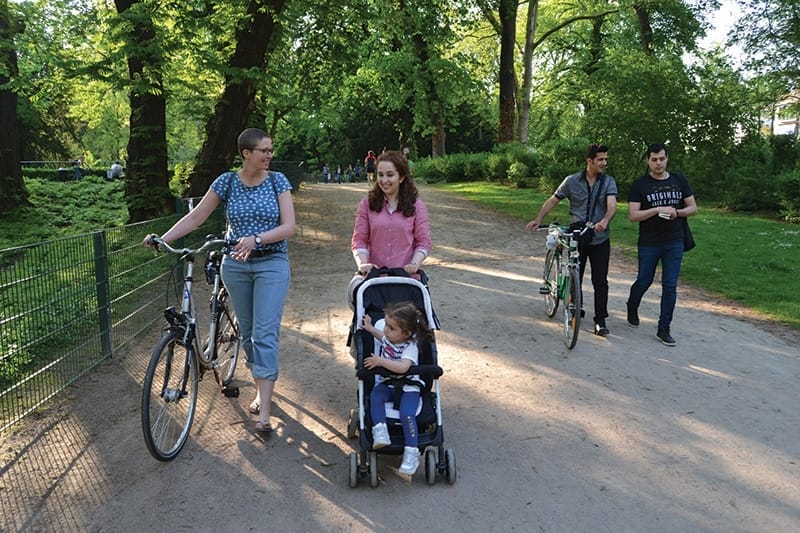
German volunteer Alexandra Einmahl and Joud Na from Aleppo, Syria, walk to a Start With a Friend group picnic in Cologne’s Volksgarten on 11th May. Photo: Matthew Lee
“It’s about meeting people at the same level,” says co-founder Sarah Rosenthal, who’s overseeing the expansion of Start With a Friend into several German cities. “It’s not about helping people or reaching goals. It’s about relationships and friendships. We speak to arrivals about their situation so we can get to know them, and then we look for a good match. Then the pairs can find their own way of deciding what they do with each other.” Rosenthal says she received 1,500 messages in three days from refugees and asylum seekers after an Arabic newspaper published a story on her organisation.
Lena Junker, the head of the Cologne branch, says her motivation is a desire not to live in a society where there are “parallel worlds”, with refugees and asylum seekers separated from everyone else. “It’s hard enough for Germans to meet new people when they arrive in a new city,” she says. “For refugees who don’t have the language skills it’s many times harder.”
Start With a Friend’s “tandems”, as the pairings are called, may not always blossom into friendships – but they’ve had numerous successes. “I met this German girl who was going on about how much she loved geocaching [an outdoor activity combining orienteering and treasure-hunting],” recalls Junker. “I didn’t expect to find her a match. But then I found a Syrian guy who loves geocaching too. The two of them are off on adventures all the time now!” It shouldn’t be too hard to find German activity partners for Ahmed and Bassam, who say their main interests are football and video games.
On 6th May, an Algerian man went to court in Cologne, accused of having sexually assaulted a woman on New Year’s Eve. He was acquitted when the unnamed victim did not recognise him as one of her attackers, and his involvement could not be proven.
He was the first man to face trial for sexual assault on that night; nine men had previously been convicted of theft. As of the middle of May, Cologne prosecutors had received 1,170 complaints of alleged attacks, 492 of a sexual nature. 159 men are currently being investigated for their role in the incidents. The authorities are relying on blurry CCTV tape and mobile phone footage and have yet to identify most of the men present. “The authorities are saying that it’s impossible to find all the men who assaulted women because of the circumstances,” says journalist Roman Lehberger. “So there’s a problem of gaining justice. They have to say to these girls who’ve been attacked ‘I’m sorry, but we can’t find whoever did this to you.’”
The high number of North African men suspected of criminal involvement put Morocco, Algeria and Tunisia in the spotlight, and on 13th May Germany declared all three “safe countries of origin”, joining countries such as Albania, Bosnia, Kosovo, Montenegro, Macedonia and Serbia. Asylum seekers from “safe countries” are unlikely to be granted refugee status, and there are fewer obstacles preventing them from being deported. It was already hard for North Africans in Germany to become refugees; last year only two percent of asylum applications from citizens of the three North African countries were approved, yet in December 2015 alone over 5,000 asylum seekers arrived in Germany from Algeria and Morocco.
Unless you know people really well it can be hard to say you’re not sure about immigration because you might get branded a Nazi”
The pressure on Merkel continues to rise. She accepted that the AfD’s success in March’s regional elections – the anti-immigrant party, which called for police to use firearms to stop migrants from entering the country, achieved the best result for a populist right-wing party in Germany since WWII – was largely due to the “unresolved question of the number of refugees” and “fears about integration”. In April her migration policy was criticised by a predecessor, Helmut Kohl, who argued that “Europe cannot become a new home for millions of people in need.”
Merkel has remained resolute in her defence of her open-door policy, yet has taken a tougher stance on those already in the country. On 25th May, the German government introduced a draft immigration law which, if passed by parliament, will see new migrants made to attend 600 hours of German language classes as well as 100 hours of tuition on German cultural and social norms. Those who fail to turn up to class will have their benefits cut.
Such measures will not placate all Germans. Polls still show a strong and broad undercurrent of discontent over the government’s handling of migration, although critical views aren’t always openly expressed. One Cologne resident I spoke to, who said that he can only support the government’s policy if new arrivals are made to renounce Islam as part of the integration process, asked not to be named. “It’s hard to find the space in German society for an open debate on immigration,” says Marcia Adair, a Canadian journalist who’s lived in Cologne for three years. “Unless you know people really well it can be hard to say you’re not sure about immigration because you might get branded a Nazi.”
In February, the authorities invested €360,000 on extra security measures for the Cologne carnival, which attracts over a million visitors every year. There were 3,200 officers on the streets, as well as “women’s security points” – secure areas staffed by social workers and psychologists. The number of reported sexual assaults more than doubled, from nine in 2015 to 22 this year, but police say this was largely due to the increased willingness of victims to report incidents following New Year’s Eve.
Back at the cathedral steps, the kickabout has petered out and the drunks have stumbled home. The police officers in the booth are monitoring an empty square. This New Year’s Eve they will be out in force – this area will be part of a “protection zone”, the specifics of which are yet to be announced. There is a determination that this year’s celebrations will pass off peacefully. For those hoping to integrate hundreds of thousands of newcomers into German society – as well as for those hoping to integrate – another New Year’s Eve crime spree could have terrible consequences.
This feature was published in our brand new issue #22. To see the story in all its printed glory, buy the issue in our shop or take out an annual subscription with promo code ‘SOCIAL20’ and we’ll send you the issue for free.
Slow Journalism in your inbox, plus infographics, offers and more: sign up for the free DG newsletter. Sign me up
Thanks for signing up.
